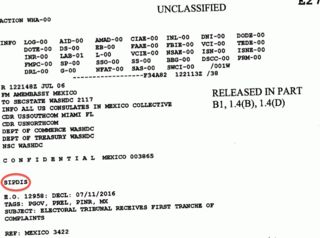
The Defense Information Systems Agency (DISA), known as the Defense Communications Agency (DCA) until 1991, is a United States Department of Defense (DoD) combat support agency composed of military, federal civilians, and contractors. DISA provides information technology (IT) and communications support to the President, Vice President, Secretary of Defense, the military services, the combatant commands, and any individual or system contributing to the defense of the United States.
The Common Criteria for Information Technology Security Evaluation is an international standard for computer security certification. It is currently in version 3.1 revision 5.

Information warfare (IW) is the battlespace use and management of information and communication technology (ICT) in pursuit of a competitive advantage over an opponent. It is different from cyberwarfare that attacks computers, software, and command control systems. Information warfare is the manipulation of information trusted by a target without the target's awareness so that the target will make decisions against their interest but in the interest of the one conducting information warfare. As a result, it is not clear when information warfare begins, ends, and how strong or destructive it is.

Novell, Inc. was an American software and services company headquartered in Provo, Utah, that existed from 1980 until 2014. Its most significant product was the multi-platform network operating system known as Novell NetWare.

Royal Air Force Menwith Hill is a Royal Air Force station near Harrogate, North Yorkshire, England, which provides communications and intelligence support services to the United Kingdom and the United States. The site contains an extensive satellite ground station and is a communications intercept and missile warning site. It has been described as the largest electronic monitoring station in the world.
Internet security is a branch of computer security. It encompasses the Internet, browser security, web site security, and network security as it applies to other applications or operating systems as a whole. Its objective is to establish rules and measures to use against attacks over the Internet. The Internet is an inherently insecure channel for information exchange, with high risk of intrusion or fraud, such as phishing, online viruses, trojans, ransomware and worms.
Multilevel security or multiple levels of security (MLS) is the application of a computer system to process information with incompatible classifications, permit access by users with different security clearances and needs-to-know, and prevent users from obtaining access to information for which they lack authorization. There are two contexts for the use of multilevel security.

Cairo was the codename for a project at Microsoft from 1991 to 1996. Its charter was to build technologies for a next-generation operating system that would fulfill Bill Gates's vision of "information at your fingertips." Cairo never shipped, although portions of its technologies have since appeared in other products.

The Secret Internet Protocol Router Network (SIPRNet) is "a system of interconnected computer networks used by the U.S. Department of Defense and the U.S. Department of State to transmit classified information by packet switching over the 'completely secure' environment". It also provides services such as hypertext document access and electronic mail. As such, SIPRNet is the DoD's classified version of the civilian Internet.

Carnivore, later renamed DCS1000, was a system implemented by the Federal Bureau of Investigation (FBI) that was designed to monitor email and electronic communications. It used a customizable packet sniffer that could monitor all of a target user's Internet traffic. Carnivore was implemented in October 1997. By 2005 it had been replaced with improved commercial software.
Network-centric warfare, also called network-centric operations or net-centric warfare, is a military doctrine or theory of war that aims to translate an information advantage, enabled partly by information technology, into a competitive advantage through the computer networking of dispersed forces. It was pioneered by the United States Department of Defense in the 1990s.
Signals intelligence by alliances, nations and industries comprises signals intelligence (SIGINT) gathering activities by national and non-national entities; these entities are commonly responsible for communications security (COMSEC) as well.
Proactive cyber defense, means acting in anticipation to oppose an attack through cyber and cognitive domains. Proactive cyber defense can be understood as options between offensive and defensive measures. It includes interdicting, disrupting or deterring an attack or a threat's preparation to attack, either pre-emptively or in self-defence.
Cyber spying, cyber espionage, or cyber-collection is the act or practice of obtaining secrets and information without the permission and knowledge of the holder of the information using methods on the Internet, networks or individual computers through the use of proxy servers, cracking techniques and malicious software including Trojan horses and spyware. Cyber espionage can be used to target various actors- individuals, competitors, rivals, groups, governments, and others- in order to obtain personal, economic, political or military advantages. It may wholly be perpetrated online from computer desks of professionals on bases in far away countries or may involve infiltration at home by computer trained conventional spies and moles or in other cases may be the criminal handiwork of amateur malicious hackers and software programmers.
Information Operations is a category of direct and indirect support operations for the United States Military. By definition in Joint Publication 3-13, "IO are described as the integrated employment of electronic warfare (EW), computer network operations (CNO), psychological operations (PSYOP), military deception (MILDEC), and operations security (OPSEC), in concert with specified supporting and related capabilities, to Information Operations (IO) are actions taken to affect adversary information and information systems while defending one's own information and information systems.

Nexor Limited is a privately held company based in Nottingham, providing products and services to safeguard government, defence and critical national infrastructure computer systems. It was originally known as X-Tel Services Limited.
The United Kingdom has a diverse cyber security community, interconnected in a complex network.

The Office of Tailored Access Operations (TAO), now Computer Network Operations, and structured as S32, is a cyber-warfare intelligence-gathering unit of the National Security Agency (NSA). It has been active since at least 1998, possibly 1997, but was not named or structured as TAO until "the last days of 2000," according to General Michael Hayden.

Federated Mission Networking (FMN) is a significant initiative to help ensure the interoperability and operational effectiveness of the North Atlantic Treaty Organization. It is a key contribution to the Connected Forces Initiative, helping Allied and Partner forces to better communicate, train, and operate together. This includes the NATO Command Structure as well as the NATO Force Structure. The purpose of FMN is ultimately to support Command, Control, Communications, Computers, Intelligence, Surveillance and Reconnaissance (C4ISR) and decision-making in operations by enabling the rapid instantiation of mission networks. Including the NATO Command Structure, 37 nations have joined the FMN initiative as so-called "FMN Affiliates" and work together under the FMN Framework Process to coordinate the design, development, and delivery of operational and technical capabilities required to conduct net-centric operations. Each development increment is referred to as an "FMN Spiral.". The respective requirements, architecture, standards, procedures, and technical instructions are documented in the so-called "FMN Spiral Specifications.". FMN Spiral Specifications are based on well-known standards and best practices, hence supported by most off-the-shelf products and vendor neutral. TACOMS standards and profiles specify a common, technology- and topology independent network interoperability layer for federated mission networks. There is also a rolling 10-year FMN Spiral Specification Roadmap of the envisioned future capabilities. At the same time, the Coalition Interoperability Assurance and Validation (CIAV) process ensures that current interoperability issues are being identified and fed back into FMN capability development.








